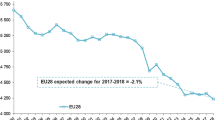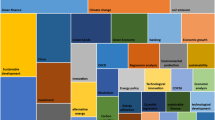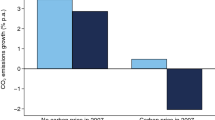Abstract
It is unclear how CO2 emissions in the German electricity sector will develop until 2030. On the one hand, the amendment in the Climate Change Act (as of August 2021) aims to tighten the emission reduction targets, fostering the pathway towards a decarbonised energy system. On the other hand, the complex interplay between the main instruments used to mitigate carbon emissions, fuel prices and the latest energy scarcity as a result of Russia’s war in Ukraine generates pressure for increased emissions.
Using an energy system model parametrised to reflect the 2021 energy market situation i.e., before Russia’s attack, our study investigates the possibility that Germany will meet its 2030 climate targets. We then provide a qualitative analysis on how results can change in light of recent events. We suggest establishing a carbon price floor that can be dynamically changed in response to the evolution of other market forces and policies. This instrument would institutionalize a more credible path towards decarbonization and offer investors certainty.
Zusammenfassung
Die zukünftige Entwicklung der CO2-Emissionen im deutschen Stromsektor bis 2030 ist unklar: Einerseits zielt die Gesetzesänderung im Klimaschutzgesetz (ab August 2021) auf eine Verschärfung der Emissionsminderungsziele ab, um den Weg zu einem dekarbonisierten Energiesystem zu fördern. Andererseits erzeugt das komplexe Zusammenspiel zwischen den wichtigsten Instrumenten zur Verringerung der Kohlenstoffemissionen, den Brennstoffpreisen und der aktuellen Energieverknappung infolge des russischen Angriffs auf die Ukraine Druck für einen Anstieg der Emissionen.
In unserer Studie untersuchen wir, ob Deutschland auf dem Weg zur Erreichung seiner Klimaschutzziele für 2030 ist, und welche Maßnahmen die Wahrscheinlichkeit erhöhen können. Dazu verwenden wir ein Energiesystemmodell, das so parametrisiert ist, dass es die Situation auf dem Energiemarkt im Jahr 2021 widerspiegelt, d. h. vor dem Angriff Russlands auf die Ukraine. Ergänzend zur quantitativen Seite liefern wir eine qualitative Analyse des Energiemarktes im Lichte der jüngsten Ereignisse. Wir betonen, wie wichtig es ist, eine Kohlenstoffpreisuntergrenze einzuführen, die als Reaktion auf die Entwicklung anderer Marktkräfte und politischer Maßnahmen dynamisch verändert werden kann. Dieses Instrument würde einen plausibleren Weg zur Dekarbonisierung institutionalisieren und Investoren Sicherheit bieten.






Similar content being viewed by others
Notes
For more information on the model see Sgarciu et al. (2023) and https://github.com/BTU-EnerEcon/EM.POWER-INVEST.
Please note that Sgarciu et al. (2023) includes the complementary results of the capacity expansion problem and the analysis of employment effects that coal phase-out has on the Lusatian region.
The sectors included in the legislation are energy, industry, buildings, transport, agriculture, waste and other, land use, land-use change and forestry.
References
Abrell, J., Kosch, M., & Rausch, S. (2022). How effective is carbon pricing?—A machine learning approach to policy evaluation. Journal of Environmental Economics and Management, 112, 102589. https://doi.org/10.1016/j.jeem.2021.102589.
Akerboom, S., Botzen, W., Buijze, A., Michels, A., & van Rijswick, M. (2020). Meeting goals of sustainability policy: CO2 emission reduction, cost-effectiveness and societal acceptance. An analysis of the proposal to phase-out coal in the Netherlands. Energy Policy, 138, 111210. https://doi.org/10.1016/j.enpol.2019.111210.
Bertram, C., Riahi, K., Hilaire, J., Bosetti, V., Drouet, L., Fricko, O., Malik, A., Nogueira, L. P., Van Der Zwaan, B., Van Ruijven, B., Van Vuuren, D., Weitzel, M., Longa, F. D., De Boer, H. S., Emmerling, J., Fosse, F., Fragkiadakis, K., Harmsen, M., Keramidas, K., Kishimoto, P. N., Kriegler, E., Krey, V., Paroussos, L., Saygin, D., Vrontisi, Z., & Luderer, G. (2021). Energy system developments and investments in the decisive decade for the Paris Agreement goals. Environmental Research Letters. https://doi.org/10.1088/1748-9326/ac09ae.
BMWK (2022). Overview of the easter package 1–9. https://www.bmwk.de/Redaktion/EN/Downloads/Energy/0406_ueberblickspapier_osterpaket_en.html
BMWK (2023). Gesetzlicher Rolloutfahrplan Ab sofort, 2023. https://www.bmwk.de/Redaktion/DE/Downloads/S-T/230111_ueberblick-smart-meter-rollout.html
Bundesministerium für Umwelt, Naturschutz, nukleare Sicherheit und Verbraucherschutz (BMUV) (2019). Klimaschutzprogramm 2030 der Bundesregierung zur Umsetzung des Klimaschutzplans 2050 (pp. 1–173). https://www.bundesfinanzministerium.de/Content/DE/Downloads/Klimaschutz/klimaschutzprogramm-2030-der-bundesregierung-zur-umsetzung-des-klimaschutzplans-2050.pdf
Bundesregierung (2022). Beschleunigter Ausbau Offshore-Windenergie. https://www.bundesregierung.de/breg-de/themen/klimaschutz/windenergie-auf-see-gesetz-2022968. Accessed 23 Nov 2022.
Clark, A., & Zhang, W. (2022). Estimating the employment and fiscal consequences of thermal coal phase-out in China. Energies. https://doi.org/10.3390/en15030800.
DW (2022). Germany reactivates coal-fired power plant to save gas. https://www.dw.com/en/germany-reactivates-coal-fired-power-plant-to-save-gas/a-62893497. Accessed 12 Dec 2022.
Edwards, M. R., Cui, R., Bindl, M., Hultman, N., Mathur, K., McJeon, H., Iyer, G., Song, J., & Zhao, A. (2022). Quantifying the regional stranded asset risks from new coal plants under 1.5 °c. Environmental Research Letters. https://doi.org/10.1088/1748-9326/ac4ec2.
EEG (2023). Gesetz für den Ausbau erneuerbarer Energien (Erneuerbare-Energien-Gesetz – EEG). https://www.gesetze-im-internet.de/eeg_2014/EEG_2023.pdf
EEG (2021). Erneuerbare-Energien-Gesetz vom 21. Juli 2014 (BGBl. I S. 1066), das zuletzt durch Artikel 8 des Gesetzes vom 8. Oktober 2022 (BGBl. I S. 1726) geändert worden ist
EEX (2022). Futures. https://www.eex.com/en/market-data/power/futures. Accessed 4 June 2022.
Egerer, J., Grimm, V., Lang, L. M., & Pfefferer, U. (2022). The German coal phase-out in 2030 under current developments. Wirtschaftsdienst, 102, 600–608. https://doi.org/10.1007/s10273-022-3260-y.
ENTSO‑E (2020). TYNDP 2020—Scenario report. https://2020.entsos-tyndp-scenarios.eu/
Europe Beyond Coal (2022). Europe’s coal exit. https://beyond-coal.eu/europes-coal-exit/. Accessed 17 Nov 2022.
European Commission (2023). Directive (EU) 2023/959 of the European Parliament and of the Council 2016 (pp. 48–119).
Federal Law Gazette I, p. 2513. Bundes-Klimaschutzgesetz vom 12. Dezember 2019 (BGBl. I S. 2513), das durch Artikel 1 des Gesetzes vom 18. August 2021 (BGBl. I S. 3905) geändert worden ist
Federal Statistical Office (2023). Prices: Data on energy price trends 49, 54. https://www.destatis.de/EN/Themes/Economy/Prices/Publications/Downloads-Energy-Price-Trends/energy-price-trends-pdf-5619002.html
Flachsland, C., Pahle, M., Burtraw, D., Edenhofer, O., Elkerbout, M., Fischer, C., Tietjen, O., & Zetterberg, L. (2020). How to avoid history repeating itself: the case for an EU Emissions Trading System (EU ETS) price floor revisited. Climate Policy, 20, 133–142. https://doi.org/10.1080/14693062.2019.1682494.
Grimm, V., Sölch, C., & Zöttl, G. (2022). Emissions reduction in a second-best world: On the long-term effects of overlapping regulations. Energy Economics, 109, 105829. https://doi.org/10.1016/j.eneco.2022.105829.
Halser, C., & Paraschiv, F. (2022). Pathways to overcoming natural gas dependency on russia—the German case. Energies, 15, 1–24. https://doi.org/10.3390/en15144939.
IEA (2021). Global energy review: CO2 emissions in 2021 Global emissions rebound sharply to highest ever level
IEA (2022). Global coal demand is set to return to its all-time high in 2022. https://www.iea.org/news/global-coal-demand-is-set-to-return-to-its-all-time-high-in-2022. Accessed 24 Nov 2022.
Jones, D., Brown, S., Czyżak, P., Broadbent, H., Bruce-Lockhart, C., Dizon, R., Ewen, M., Fulghum, N., Copsey, L., Candlin, A., Rosslowe, C., & Fox, H. (2023). European Electricity Review 2023. Ember Climate. https://ember-climate.org/insights/research/european-electricity-review-2023/
Kalkuhl, M., Steckel, J. C., Montrone, L., Jakob, M., Peters, J., & Edenhofer, O. (2019). Successful coal phase-out requires new models of development. Nature Energy, 4, 897–900. https://doi.org/10.1038/s41560-019-0500-5.
Keles, D., & Yilmaz, H. Ü. (2020). Decarbonisation through coal phase-out in Germany and Europe—Impact on emissions, electricity prices and power production. Energy Policy, 141, 111472. https://doi.org/10.1016/j.enpol.2020.111472.
Leroutier, M. (2022). Carbon pricing and power sector decarbonization: Evidence from the UK. Journal of Environmental Economics and Management, 111., .
Li, N. (2021). Experience and enlightenment of energy transition in Germany. IOP Conference Series: Earth and Environmental Science. https://doi.org/10.1088/1755-1315/621/1/012172.
Müsgens, F. (2006). Quantifying market power in the German multi-regional dispatch model Ã. The Journal of Industrial Economics, 54., .
Müsgens, F., & Ockenfels, A. (2006). Marktdesign in der Energiewirtschaft. In W. Franz, H. J. Ramser & M. Stadler (Eds.), Umwelt Und Energie (p. 289). Mohr Siebeck. https://doi.org/10.1111/j.1467-6451.2006.00297.x.
Newbery, D. M., Reiner, D. M., & Ritz, R. A. (2019). The political economy of a carbon price floor for power generation. The Energy Journal, 40, 1–24. https://doi.org/10.5547/01956574.40.1.dnew.
Oei, P. Y., Brauers, H., & Herpich, P. (2020a). Lessons from Germany’s hard coal mining phase-out: policies and transition from 1950 to 2018. Climate Policy, 20, 963–979. https://doi.org/10.1080/14693062.2019.1688636/SUPPL_FILE/TCPO_A_1688636_SM5319.PDF.
Oei, P. Y., Hermann, H., Herpich, P., Holtemöller, O., Lünenbürger, B., & Schult, C. (2020b). Coal phase-out in Germany—Implications and policies for affected regions. Energy. https://doi.org/10.1016/J.ENERGY.2020.117004.
Osorio, S., Pietzcker, R. C., Pahle, M., & Edenhofer, O. (2020). How to deal with the risks of phasing out coal in Germany. Energy Economics, 87, 104730. https://doi.org/10.1016/J.ENECO.2020.104730.
Pahle, M., Edenhofer, O., Pietzcker, R., Tietjen, O., Osorio, S., & Flachsland, C. (2019). Die unterschätzten Risiken des Kohleausstiegs. Jg 4–7
Parteienkoalition (2021). Koalitionsvertrag 2021–2025 zwischen der Sozialdemokratischen Partei Deutschlands (SPD), BÜNDNIS 90/DIE GRÜNEN und den Freien Demokraten (FDP). https://doi.org/10.1515/9783839463079
Perino, G. (2019). Reply: EU ETS and the waterbed effect. Nature Climate Change, 9, 736. https://doi.org/10.1038/s41558-019-0580-z.
Pietzcker, R. C., Osorio, S., & Rodrigues, R. (2021). Tightening EU ETS targets in line with the European Green Deal: Impacts on the decarbonization of the EU power sector. Applied Energy, 293, 116914. https://doi.org/10.1016/j.apenergy.2021.116914.
Rentier, G., Lelieveldt, H., & Kramer, G. J. (2019). Varieties of coal-fired power phase-out across Europe. Energy Policy, 132, 620–632. https://doi.org/10.1016/J.ENPOL.2019.05.042.
Riepin, I., Möbius, T., & Müsgens, F. (2021). Modelling uncertainty in coupled electricity and gas systems—Is it worth the effort? Applied Energy, 285, 116363. https://doi.org/10.1016/J.APENERGY.2020.116363.
Sgarciu, S., Scholz, D., & Müsgens, F. (2023). How CO2 prices accelerate decarbonisation—The case of coal-fired generation in Germany. Energy Policy, 173, 113375. https://doi.org/10.1016/j.enpol.2022.113375.
Sharma, V., Greig, C., & Lant, P. (2021). What is stopping India’s rapid decarbonisation? Examining social factors, speed, and institutions in Odisha. Energy Research & Social Science, 78, 102117. https://doi.org/10.1016/j.erss.2021.102117.
Song, F., Mehedi, H., Liang, C., Meng, J., Chen, Z., & Shi, F. (2021). Review of transition paths for coal-fired power plants. Global Energy Interconnection, 4, 354–370. https://doi.org/10.1016/j.gloei.2021.09.007.
Srinivasan, S., Chattopadhyay, D., Govindarajalu, C., & Zabidin, I. (2022). Business models for accelerating phase-out of coal based generation: Developing typologies and a discussion of the relative merits of alternative models. The Electricity Journal, 35, 107185. https://doi.org/10.1016/j.tej.2022.107185.
Statistisches Bundesamt (2022). Electricity production in the 1st half of 2022. https://www.destatis.de/EN/Press/2022/09/PE22_374_43312.html. Accessed 24 Nov 2022.
Statistisches Bundesamt (2023). Monthly natural gas imports. https://www.destatis.de/EN/Themes/Economy/Foreign-Trade/Tables/natural-gas-monthly. Accessed 18 Aug 2023.
Tan, H., Thurbon, E., Kim, S. Y., & Mathews, J. A. (2021). Overcoming incumbent resistance to the clean energy shift: How local governments act as change agents in coal power station closures in China. Energy Policy, 149, 112058. https://doi.org/10.1016/j.enpol.2020.112058.
Trencher, G., Healy, N., Hasegawa, K., & Asuka, J. (2019). Discursive resistance to phasing out coal-fired electricity: Narratives in Japan’s coal regime. Energy Policy, 132, 782–796. https://doi.org/10.1016/j.enpol.2019.06.020.
Umweltbundesamt (2022). Entwicklung der spezifischen Treibhausgas-Emissionen des deutschen Strommix in den Jahren 1990 bis 2013. Umweltbundesamt, 34, 12.
Walk, P., & Stognief, N. (2022). From coal phase-out to net zero: Driving factors of UK climate policy. Environmental Science & Policy, 138, 76–84. https://doi.org/10.1016/j.envsci.2022.09.019.
Wang, Y., Mao, J., Chen, F., & Wang, D. (2022). Uncovering the dynamics and uncertainties of substituting coal power with renewable energy resources. Energy, 193, 669–686. https://doi.org/10.1016/j.renene.2022.04.164.
Wendling, Z. A. (2019). Bridges beyond renewable energy: Decarbonizing the global electricity sector under uncertainty. Energy Research & Social Science, 48, 235–245. https://doi.org/10.1016/j.erss.2018.09.020.
Yan, J. (2021). The impact of climate policy on fossil fuel consumption: Evidence from the Regional Greenhouse Gas Initiative (RGGI). Energy Economics, 100, 105333. https://doi.org/10.1016/j.eneco.2021.105333.
Acknowledgements
We gratefully acknowledge financial support from the Federal Ministry of Education and Research of Germany in the Ariadne project (03SFK5S0) and DecarbLau project (FKZ 01LA1821A). This research represents a collaborative work between modelling practitioners from both projects and aims to bridge the gap between common research questions from projects funded by BMBF.
Author information
Authors and Affiliations
Corresponding author
Ethics declarations
Conflict of interest
S. Sgarciu, F. Müsgens, S. Osorio and M. Pahle declare that they have no competing interests.
Additional information
Publisher’s Note
Springer Nature remains neutral with regard to jurisdictional claims in published maps and institutional affiliations.
Rights and permissions
Springer Nature or its licensor (e.g. a society or other partner) holds exclusive rights to this article under a publishing agreement with the author(s) or other rightsholder(s); author self-archiving of the accepted manuscript version of this article is solely governed by the terms of such publishing agreement and applicable law.
About this article
Cite this article
Sgarciu, S., Müsgens, F., Osorio, S. et al. Is Germany on track to achieve 2030 climate and energy targets?. List Forum 49, 93–107 (2024). https://doi.org/10.1007/s41025-023-00255-0
Accepted:
Published:
Issue Date:
DOI: https://doi.org/10.1007/s41025-023-00255-0




